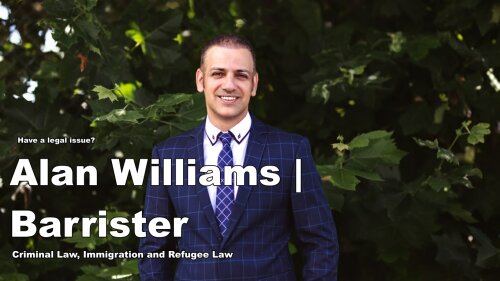Best Drunk Driving Lawyers in New Zealand
Share your needs with us, get contacted by law firms.
Free. Takes 2 min.
Or refine your search by selecting a city:
List of the best lawyers in New Zealand
About Drunk Driving Law in New Zealand
Drunk driving, also known as driving under the influence (DUI) or driving while intoxicated (DWI), is a serious offense in New Zealand. The laws are stringent, reflecting the country's commitment to road safety and the prevention of alcohol-related accidents. The legal limit for blood alcohol concentration (BAC) is lower for drivers under the age of 20 at zero tolerance, meaning they must not have any alcohol in their system. For drivers over 20, the legal limit is 250 micrograms of alcohol per liter of breath or 50 milligrams of alcohol per 100 milliliters of blood.
Why You May Need a Lawyer
There are several situations where individuals may require legal assistance when facing drunk driving charges:
- First-time Offenders: Navigating the legal process and understanding potential penalties can be challenging.
- Repeat Offenders: If you have previous DUI convictions, the legal consequences could be more severe, necessitating expert legal guidance.
- Accidents and Injury: If a DUI results in an accident or injury, the charges and penalties are typically more serious, calling for a lawyer's experience in handling such cases.
- Occupational Concerns: Professionals who depend on driving for their livelihood may face job threats, requiring legal help to explore all possible defenses.
- License Suspension: If your driving license is at risk of being suspended, a lawyer can help manage the process and seek possible alternatives like work-related licenses.
Local Laws Overview
Drunk driving laws in New Zealand are comprehensive and include penalties such as fines, demerit points, license suspension, and even imprisonment for serious cases. Key aspects include:
- Zero Alcohol Limit: For drivers under 20, having any trace of alcohol in the system is illegal.
- Roadside Testing: Police have the right to perform random breath tests to check for drink drivers.
- Penalties for Over the Limit: Exceeding the legal BAC limit can result in fines, disqualification, and demerit points.
- Penalties for High-level Readings: A BAC reading well above the legal limit can lead to more severe penalties, including prosecution in court.
- Repeat Offenders: Being caught multiple times increases the severity of penalties exponentially.
- Alcohol Interlock Program: For those repeatedly offending, or those with particularly high BAC levels, participation in the Alcohol Interlock Program might be mandated.
Frequently Asked Questions
What is the legal blood alcohol concentration (BAC) limit in New Zealand?
The legal BAC limit for drivers over 20 is 250 micrograms per liter of breath or 50 milligrams per 100 milliliters of blood. For drivers under 20, the limit is zero.
What are the penalties for a first-time DUI offense?
Penalties can include fines, demerit points, and disqualification from driving. In some cases, offenders may be required to complete the Alcohol Interlock Program or attend educational courses.
Can I refuse a breath test?
Refusing to take a breath test when requested by a police officer is an offense and can result in penalties equivalent to a DUI conviction.
What happens if I am caught drunk driving as a repeat offender?
Repeat offenders face harsher penalties, including higher fines, longer disqualification periods, and possibly imprisonment. Participation in the Alcohol Interlock Program may also be required.
How does a DUI conviction affect my driver’s license?
A DUI conviction usually results in the suspension or disqualification of your driver's license for a period determined by the severity of the offense and your driving history.
Is it possible to obtain a limited license for work purposes if my license is suspended?
In some cases, you may apply for a limited license to drive under certain conditions, such as work-related travel, subject to court approval.
What is the Alcohol Interlock Program?
The Alcohol Interlock program requires offenders to install an interlock device in their vehicle. This device prevents the car from starting if alcohol is detected on the driver's breath.
Will a DUI conviction appear on my criminal record?
A DUI conviction will appear on your criminal record, which can have implications for future employment and travel.
Are there different penalties depending on how much over the limit I am?
Yes, penalties can be more severe depending on the BAC reading, with higher readings attracting harsher fines and possible imprisonment.
What should I do if I'm charged with drunk driving?
It is crucial to seek legal advice immediately to understand your rights, obligations, and possible defense strategies.
Additional Resources
If you need more information or assistance regarding drunk driving, the following resources may be helpful:
- New Zealand Transport Agency (NZTA): Offers guidance on legal limits, penalties, and the interlock program.
- Community Law Centres: Provide free legal advice and support, including assistance with traffic-related offenses.
- Alcohol and Drug Helpline: Offers support to those struggling with alcohol dependence.
- The New Zealand Police: Provides information related to road safety and traffic offense resources.
Next Steps
If you suspect you might be charged with drunk driving, or have been charged, taking swift action is essential:
- Seek Legal Counsel: Contact a lawyer experienced in DUI cases to ensure you receive accurate and helpful advice.
- Gather Evidence: Collect any relevant documents or evidence that might support your case.
- Know Your Rights: Familiarize yourself with your legal rights and responsibilities when facing a DUI charge.
- Attend All Required Hearings: Be present at all court hearings and comply with any court requirements or recommendations.
- Explore Programs and Courses: Engage in educational programs or courses that might show your commitment to responsible driving and assist in your case.
Lawzana helps you find the best lawyers and law firms in New Zealand through a curated and pre-screened list of qualified legal professionals. Our platform offers rankings and detailed profiles of attorneys and law firms, allowing you to compare based on practice areas, including Drunk Driving, experience, and client feedback.
Each profile includes a description of the firm's areas of practice, client reviews, team members and partners, year of establishment, spoken languages, office locations, contact information, social media presence, and any published articles or resources. Most firms on our platform speak English and are experienced in both local and international legal matters.
Get a quote from top-rated law firms in New Zealand — quickly, securely, and without unnecessary hassle.
Disclaimer:
The information provided on this page is for general informational purposes only and does not constitute legal advice. While we strive to ensure the accuracy and relevance of the content, legal information may change over time, and interpretations of the law can vary. You should always consult with a qualified legal professional for advice specific to your situation.
We disclaim all liability for actions taken or not taken based on the content of this page. If you believe any information is incorrect or outdated, please contact us, and we will review and update it where appropriate.
Browse drunk driving law firms by city in New Zealand
Refine your search by selecting a city.
















